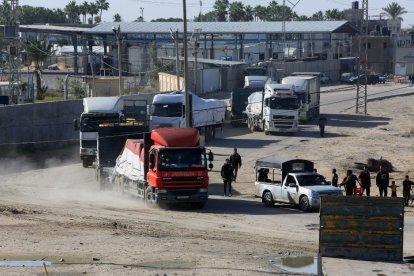The million-dollar business of Egyptian 'migration service' agencies in Rafah
They "coordinate" payment which involves registering travelers' names on the Egyptian list of Palestinians approved by the government in exchange for thousands of dollars.

(Cordon Press)
After Hamas invaded Israel on October 7, many people began to contemplate history, economics, geopolitics and life in the Middle East. One issue that came to light was Egypt's longstanding and systematic restriction of the opening of its border crossing with the Gazan city of Rafah. Following Hamas' electoral victory and subsequent takeover of the Strip in 2007, Egypt implemented border controls to counteract the terrorist activities of the Gazan government. It was during this time that offers for paid “border services” began to surface.
Palestinians paying to leave Gaza is nothing new. Hamas deteriorated citizens' living conditions by implementing a radicalized Islamization of society while directing the considerable resources it received toward the militarization of the territory. Those who did not accept such harsh conditions have tried to leave Gaza, prompting the emergence of a network of intermediaries and travel agencies linked to the Egyptian bureaucracy and intelligence. These entities sell permits to leave the Palestinian enclave. The area has been managed for 17 years, on the one hand by the Hamas Interior Ministry and on the other by the Egyptian security forces and the General Intelligence Service.
But with the war, demand grew and in recent months these services became more expensive, reaching exorbitant prices that have allowed these intermediaries to amass fortunes. As detailed in various journalistic accounts, bribes of thousands of dollars are paid to enter the Egyptian territory. According to an investigation conducted by the Organized Crime and Corruption Reporting Project (OCCRP) and the fact-checking site Saheeh Masr, brokers sell permits at prices ranging from $4,500 to $10,000. One of the most well-known suppliers is the Egyptian travel agency Hala Consulting and Tourism, founded by Ibrahim El-Argani, a businessman with ties to Egyptian government institutions. These connections enable the company to obtain rapid authorization from the Egyptian security services that control the border. However, with the surge in demand, new agents have entered the business, promising high profitability while simultaneously saturating the market with thieves and scammers.
According to Haisam Hassanein, an Egyptian-American researcher and adjunct fellow at the Foundation for Defense of Democracies, Al Organi's connections are key to managing his service in a process known as “tanseeq,” the Arabic word for “coordination.” This “coordination” consists of registering names on the Egyptian list of travelers approved to enter from Gaza and transporting them from the border to Cairo. The agencies that provide the crossing service publish daily, on social media and messaging services, the list of travelers approved by the government for the next day. It is estimated that around 400 travelers cross per day. In total, they pay over a million dollars to the coordinators, according to an NPR analysis based on published traveler lists and an estimate of the fares paid by adults and minors.
About the payment of fees at the Gaza border, Ahmed Benchemsi, regional director of Human Rights Watch communications, claimed that "in 2022, we already collected testimonies about Egyptian officials extorting Palestinians to allow them to exit from Rafah," adding: "New reports of skyrocketing bribe rates for those desperate to leave are disheartening."
Egypt has denied that such payments exist. The head of Egypt's State Information Service, Diaa Rashwan, said that these are “unfounded accusations.” Egyptian Foreign Minister Sameh Shoukry said that his country does not tolerate Hala's practice of charging $5,000 for each Palestinian who crosses: "We will take all necessary measures to restrict and eliminate it totally," Sameh said. According to Hassanein, the cost of the permits is the government's way of filtering travelers to prevent migratory movement. The high tariffs are Egypt's way of avoiding absorbing Palestinians, as the country does not want mass immigration because it wants to prevent Islamist militants from coming from Gaza.
The political and economic issue involved in collecting immigration permits is a very volatile issue for the Egyptian government. Days after the outlet Mada Masr published a report on charging for coordination services at the Rafah border crossing, prosecutors from Cairo questioned its editor-in-chief and the case is still open. Censorship looms over news about the agencies' connections with public officials. However, the daily publication of permits leaves little room for doubt regarding the million-dollar corruption system that is alleged to be perpetrated.
For many Palestinians, crowdfunding has become the only way to cover the cost of “coordination” services. Thousands of people have turned to these financing platforms to raise money to be included on the list to enter Egypt. On GoFundMe alone, there are more than 12,000 campaigns. However, these platforms require having a bank account in the supported countries, which usually do not include Egypt, which is why many Palestinians launched personal campaigns on social media asking for help. Once they collect the amount they need, the money needs to be sent to the coordinator in cash and in U.S. dollars. This is a challenge given that it is difficult for the average citizen to get U.S. currency in Egypt. Still, payment alone is no longer enough to guarantee a fast crossing because there are delays on Egypt's side, even for those who pay additional fees.
Entering Egypt was never easy. Bureaucratic obstacles, long delays in visa approvals and frequent denials have been conscientiously enforced policies by the authorities. Amid the crisis, the country not only failed to modify its policy but also toughened it, allowing close associates to enrich themselves by profiting from these services. Although these services operate outside the law, they are so openly promoted that it is difficult to believe that the Egyptian government has no interest in maintaining them and enjoying their million-dollar benefits. Palestinians in the territory and their relatives abroad have said that they had no choice but to rely on the network of intermediaries, which has seen its size and wealth multiply in just six months.
RECOMMENDATION





















